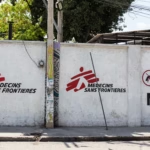Law enforcement agencies across Florida have detained more than 6,000 individuals suspected of residing illegally in the United States as part of an immigration enforcement campaign conducted in partnership with federal authorities, the Miami Herald reports. This large-scale offensive relies on unprecedented coordination between municipal police departments, the state of Florida, and federal immigration agencies.
According to figures provided by the U.S. Border Patrol and cited by the Miami Herald, over 350 of these detentions stem directly from an initiative called Operation “One Way Ticket.” This effort simultaneously mobilizes several tiers of law enforcement: county sheriff’s offices, the state highway patrol, federal immigration services, and additional partners working under 287(g) agreements.
These agreements, which have proliferated in Florida since the beginning of the year, grant local police officers authority typically reserved for federal immigration agents. In practice, municipal officers and sheriff’s deputies may now identify, question, and transfer to federal authorities individuals who are subject to deportation orders or suspected of violating immigration laws.
Brevard County Sheriff Wayne Ivey, a prominent public advocate of this strategy, articulated the local authorities’ position plainly: “If you come into our country illegally, you broke the law.” Lieutenant Governor Jay Collins confirmed the state’s long-term commitment by warning that “more operations are on the way,” according to the Miami Herald.
Jeff Dinise, a sector chief with the U.S. Border Patrol, praised the scope of local engagement. “The state of Florida and our Florida sheriffs have embedded in every facet of homeland security,” he stated, emphasizing what he described as an unprecedented level of coordination across different law enforcement layers.
The Miami Herald reports that Florida now houses individuals awaiting deportation in state-operated facilities, including locations near Jacksonville. This shift marks a departure from decades-old practice, under which immigrant detention fell exclusively to federal authorities or centers contracted with Immigration and Customs Enforcement. By assuming this responsibility, state officials assert they aim to establish a national model for immigration enforcement.
Highway Safety Director Dave Kerner called this approach vital, stating it boosts law enforcement’s ability to partner with ICE and protect communities from illegal immigration.
The campaign has drawn sharp criticism. Immigrant rights organizations contend this operational framework inevitably produces discrimination and profiling, arguing that expanded local authority encourages stops based on physical appearance, accent, or presumed ethnicity rather than objective suspicion.
More concerning to advocates, documented cases show U.S. citizens have been mistakenly detained during these operations. These incidents raise questions about local officer training, procedural protections, and the safeguarding of constitutional rights for all residents, regardless of origin.
Immigrant communities, including those with legal status, describe an atmosphere of mounting fear. Hesitation to engage with police, even to report crimes or serve as witnesses, could paradoxically compromise public safety by eroding cooperation between law enforcement and the public.
From an economic perspective, sectors in Florida that are heavily dependent on immigrant labor—such as agriculture, construction, hospitality, and services—may experience labor shortages, production delays, and financial strain as a result of the mass detentions. According to some employers, the detention of workers has led to increased hiring difficulties, disruptions in meeting seasonal or project deadlines, and lower overall productivity, as reported by the Miami Herald.
With 327 active 287(g) agreements, Florida now positions itself as the U.S. state most committed to this local-federal collaboration program.
Lieutenant Governor Collins’s pledge to conduct additional operations suggests ongoing escalation in the coming months, maintaining sustained pressure on immigrant communities throughout the state.
Reporting by John Baker for the Miami Herald (Oct. 14, 2025), with statements from U.S. Border Patrol and Florida officials.

Source: Miami Herald







